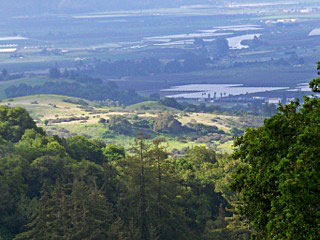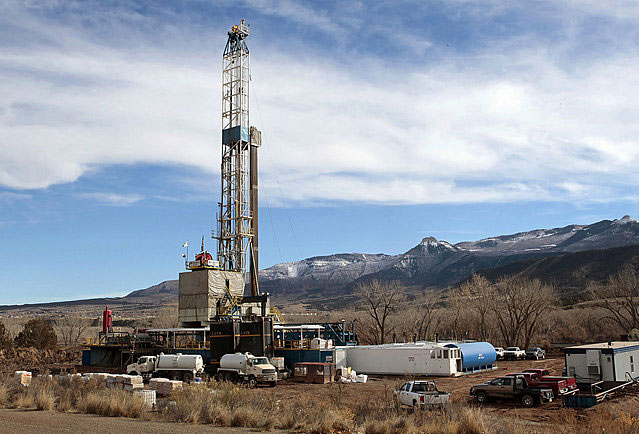Santa Cruz County Moves to Adopt Fracking Moratorium
December 2013

The new fracking moratorium for Santa Cruz County will protect our homes, farms and water supply. (Photograph: Kenn Reiller).
On September 9th, 2013 the Santa Cruz County Board of Supervisors took a vote to move forward with a moratorium on all oil or gas development in the County. In October, after the necessary public noticing period had passed, the Board put a moratorium in force for all the unincorporated areas of the County. This begins the process of amending the Santa Cruz County General Plan to establish a moratorium on Fracking.
Sierra Club California and various Sierra Club Chapters from the Ventana Chapter south to the Angeles Chapter are organizing to confront the environmental threats posed by this new oil drilling technology. In the Monterey Shale "tight oil" or shale oil is the target of the fossil fuel industry, rather than natural gas. A "well stimulation" technique called acid stimulation is likely to be the extraction method of choice for the oil industry in the Monterey Shale. Acid stimulation is intended to chemically melt rock when it is combined with the high-pressure hydraulic fracturing techniques that began to be widely used in the 1990s. Contrary to oil industry public relations, Fracking is a new technology with a relatively short track record. Many problems have been exposed. Once the international price of oil rises again, drilling in the Monterey Shale is likely to increase rapidly unless our local governments act to prevent it.
Other efforts to ban Fracking
The City of Los Angeles has begun a similar process to that of Santa Cruz County to stop any Fracking within that city's limits. In Colorado the cities of Longmont, Boulder, Lafayette, Fort Collins, and Broomfield have all passed Fracking moratoriums. There are currently over 51,000 Fracking wells in Colorado and more than 250,000 such wells in eleven states. Numerous problems including surface and ground water pollution, air pollution, gas flaring, earthquakes and the disruption of residential peace are driving the backlash against these new well drilling techniques. New York State has a moratorium on Fracking largely after studying the impacts in adjacent Pennsylvania. In the Marcellus Shale there, Fracking well drillers use 5 million gallons of water to frack each well site. Wells of this type use horizontal boring and may have several such horizontal bores extending from a single well production pad. This is oil and gas drilling on a different scale than Californians have ever experienced. Radioactive isotopes from deep in the earth are being discovered in the flow-back water after Fracking in Pennsylvania.
Why the recently passed CA Senate Bill 4 could do more harm than good
After the passage of Senate Bill 4 (SB4) during the most recent CA State legislative session this fall, it became clear that the State was not going to establish any new regulations for Fracking and acid stimulation drilling methods until at least 2015. On top of that SB4 codified a complex form of non-disclosure about the volumes of chemicals to be used in any well stimulation or hydraulic fracturing permit. SB4 was amended ten times before its eventual passage and the legislation became progressively weaker and less protective of public health and the environment. Sierra Club's worse fears about SB4, that the oil industry would believe that it no longer had to do environmental review at fracking sites, were confirmed less than a month after Brown signed the legislation.
On October 25, the Western States Petroleum Association (WSPA), the trade association for the oil industry, filed a motion to have a previous lawsuit filed by Sierra Club and others against the Department of Gas, Oil and Geothermal Resources (DOGGR) dismissed as "moot" based specifically on SB 4. This lawsuit which Sierra Club and Center for Biological Diversity brought against DOGGR challenged that the agency violated the California Environmental Quality Act (CEQA) by approving oil and gas wells without adequate CEQA review of the impacts of fracking.
The oil industry countered in their lawsuit that now because of SB 4, the legislature has in fact directed DOGGR to allow hydraulic fracturing to occur, subject only to the operator's certificate of compliance without the need for CEQA review until DOGGR conducts an EIR sometime after July 2015.
What you can do in Monterey County

Who will ask for a moratorium to protect our homes, farms and water supply from this in Monterey County?
Monterey County members need to tell their Monterey County Supervisors they want a moratorium on Fracking. Monterey County has the authority to prevent new oil drilling near your home, school or farm.
Remind them that oil and gas exploration and development has raised public health, safety and welfare concerns caused by pollution of air, soil, surface water, and groundwater; depletion of water supplies; noise pollution and seismic hazards.
Furthermore, greenhouse gas emissions resulting from oil and gas exploration and burning fossil fuel are warming the planet and causing climate change with potential public health, safety and economic impacts including increased risk of flooding, erosion, water shortages and wildfires.
< back to all issues

